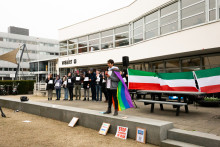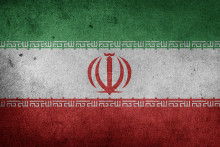Last week, Iranian researcher Ramin Yazdaanpanah posted a public message on LinkedIn, sharing his rejection for a PhD position at the UT. According to Yazdaanpanah, he was told by an email from the professor that the UT is not allowed to accept students from the Iranian university where he studied. Yazdaanpanah calls this decision 'a severe violation of racial equality in education and an obvious discriminatory decision'.
His statement on LinkedIn led to almost five hundred reactions. Yazdaanpanah's story mainly received a lot of support in the comments. One researcher who reacted to his message speaks of academic racism, another of a violation of human rights. But there are also researchers who point out the government regulations that Dutch universities have to comply with, because some countries - including Iran - send students to leading universities to 'collect information on strategic technologies'.
No discrimination
For reasons of privacy, the UT cannot comment on Yazdaanpanah's individual case, says spokesman Laurens van der Velde. He does, however, respond to the themes raised in the comments, such as discrimination. ‘As UT we do not discriminate in application procedures. The accusation in the reactions that the UT acts racist is not correct. For years, we have welcomed many Iranian employees, PhD students and students. Iranians are valued members of our community.’
Sanctions
Van der Velde also explains the government regulations to which Dutch universities are bound. ‘The UN and the EU have issued sanctions against countries or organizations. These sanctions affect people who are or were connected to organizations on the international sanctions list. Universities are not allowed to hire anyone who worked or studied for a scientific organization on that list.’
In every application procedure, candidates are 'screened' to see if they have a link with organizations on the sanctions list, Van der Velde continues. Van der Velde cannot say how many rejections there are each year. There are no figures available. ‘It is a complex screening because we have to deal with different spellings, affiliated organizations or organizations with almost the same name.’
Mistake
The UT has since contacted Yazdaanpanah to discuss the matter, says Van der Velde. The spokesperson does not comment on the content of the conversation, also because of privacy rules. However, Yazdaanpanah did post a message on his LinkedIn account on Tuesday. The researcher says that he learned in the conversation that the UT must refuse certain institutions and organizations in Iran because of government sanctions.
His case, however, was based on a mistake by the HR department, says Yazdaanpanah. His university (Tehran University) is not on the sanctions list. But the name of his high school (Shahid Beheshti) is the same as the name of an Iranian university that is on the sanctions list. Therefore, Yazdaanpanah was refused at the UT.
The Iranian researcher thanks the UT for the explanation and says that his story is thus concluded. He adds, though, that students should not be punished for the activities of their government, even if they study or work at institutions on the sanctions list. Spokesperson Laurens van der Velde further states that the UT will 'critically examine' the admission process with those involved. ‘To prevent unintentional exclusion in the future.’






